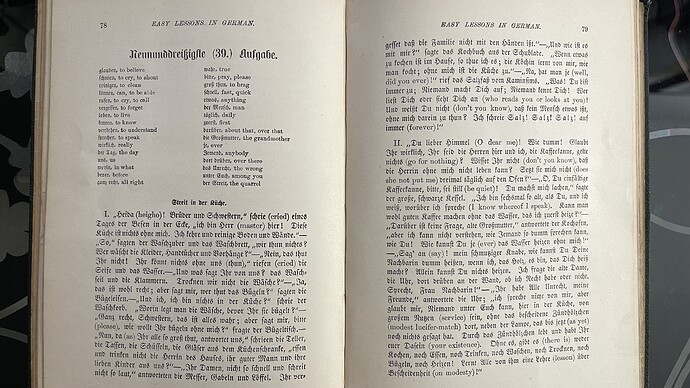When helfen is used as an auxiliary verb with a dependent infinitive, does it still take the dative? In the book “Cochran’s German Review Grammar,” the following examples are given:
Ich helfe das Geschäft begründen (I am helping to establish the business)
Ich habe das Geschäft begründen helfen (I helped to established the business)
Why isn’t das Geschäft in the dative?
I’m definitely not a grammar expert on this, so this may not be correct, but my take on this is that the dative is used for the object of the help. I think in this case those being helped are “others” not explicitly mentioned. i.e. Ich helfe (ihnen) das Geschäft begründen
ihnen is the dative the goes with helfe, not Geschäft .
If I help the business directly:
Ich helfe dem Geschäft
Then the dative is used for Geschäft
On the other hand, it may just be related to the auxiliary verb formation…in that case it seems it is “supporting” the main verb begründen and not explicitly tied to the business.
2 Likes
Hmm…are you sure you copied the sentences corectly? I don´t even understand them.
(I helped to established the business) Doesn´t look correct to me either.
Interesting question. Not easy to find the answer. I did find this opinion. Other opinions were unequivocally on the side of dative.
Hi Marco.
Could it be that “das Geschäft” is the object of the verb “begründen”?
I think “das Geschäft begründen” is a verb phrase, with das Geschäft in accusative.
Maybe we could replace the verb phrase with another verb like.
Also, in these examples, the person you are helping isn’t mentioned, for example “my friend” - meinem Freumd.
So with a dative object:
Ich helfe meinem Freumd das Geschäft begründen.
I hope this insight helps - not sure if it’s correct, just based on my knowledge of lingustics.
2 Likes
Thank you. All insight helps. At this stage of my learning, helfen (and some other verbs) only take the dative and I read the sentence as helping to do something, where the to do something is to establish a business. I thought about das Geschäft being the object of begründen, but I couldn’t reason it out with the dative verb.
Thank you. Yes, I copied the sentences correctly. I was thinking that someone might point out that it is a typo in the book; however, the book has been around for a long time (I’m using the 4th Ed) and something like that would have been found by now. I’m assuming the book is correct, but it could be a typo.
Thank you. What you say makes sense. I was trying to reason it out with another object but failed to see it as clearly as how you presented it. I couldn’t find anything that would support dative verbs used in auxiliary verb formations, so I ruled that out. The implied dative object (ihnen) works. I know I have been confused before by not considering an implied subject or object. It would be nice to find a rule for this sort of case.
Thank you. This supports what ericb100 states below.
Hi Marco,
the construction with “helfen” in German is like this:
- “helfen” alone is with Dativ (question: wem?)
- Ich helfe meinem Freund / meiner Freundin.
- Ich helfe dem Fahrradradfahrer, aufzustehen (nachdem er gestürzt ist).
- However, in your example sentences “das Geschäft” refers to the infinitive “begründen” (and “begründen” is followed by the Akkusativ → question: wen oder was?).
That said, using “begründen” in this context is bad German. Native speakers of German usually use the verb “gründen”. For example, in the following collocations:
- ein Reich / Empire gründen
- eine Firma gründen
- einen Startup gründen
BTW, “gründen” is also used with the Akkusativ because the construction is “etwas (= Akkusativ) gründen”.
However, it’s better to learn the common collocations “ein Reich / eine Firma, etc. gründen” because this way you’ll immediately know the complete verb constructions “verb + Akkusativ or Dativ”.
And if you want to use “helfen” plus “gründen”, common collocations would be, for example:
- Ich helfe ihm / ihr / ihnen (= wem? → Dativ), ein Reich / Empire (was? → Akkusativ) zu gründen.
- Du sollst ihnen (wem? → Dativ) helfen, ein Startup (was? → Akkusativ) zu gründen.
Hope that helps
Peter
3 Likes
Peter,
Thank you. Yes, it does help, especially your examples. I suspected that much, but I don’t have the confidence (feel for the language) yet to reason it out. I’m grateful to you and others for all the help.
When I see something I don’t understand or what appears to be an inconsistency, I default to there is more I need to know; however, in — rare instances — there could be a published oversight, which could take me down a rabbit hole if it is, indeed, an oversight.
I understand exactly what you mean by “bad German.” I have made German statements that are grammatically correct only to hear ”Germans would never say it that way.” That is a gotcha a self-learner has to be aware of.
Thank you again. I now have more clarity regrading the use of helfen (and other dative verbs) with a dependent infinitive (the main verb).
2 Likes
“That is gotcha a self-learner has to be aware of.”
Yes. Unfortunately, the collocation problem haunts us in “every” language that isn’t our mother tongue.
And there is no simple solution for it (see our current discussion about “Schachtelsätze” in German where we also talk about collocations).
On the other hand, the good news is:
As long as communication doesn’t break down, pronunciation, collocation, etc. errors are usually no problem because humans and natural languages are quite fault tolerant 
Have a nice weekend
Peter
2 Likes
I couldn’t find anything helpful online to be honest. Surprisingly it’s not in my tome of a grammar book because it seems like it would be a fairly common situation
1 Like
I don´t know, all I can say is that I´m a native speaker and that the sentences are incomprehensible. Peter Bormann gave a good explanation.
2 Likes
This is where it came from. Thank you for your comment.
1 Like
Strange. “Er heißt mich gehen” also sounds weird. Apparently it was published in 1990, I looked it up because I was wondering if it was written 200 years ago. Might not be the best book to use.
2 Likes
He orders me to go <-> “er heißt mich gehen”.
DerPauleglot is right. No native speaker of German would use this sentence (nowadays → maybe we said in the 18th / 19th centuries something like: “Ich heiße Sie an, zu gehen!” ).
The translation of “he orders me to go” is simply <-> “er befiehlt mir[,] zu gehen”.
It seems that your reference book is not only old, but also has never been checked by German native speakers. So you can’t rely on this source for your grammar study.
However, I wouldn’t learn such grammar constructions at all. It’s really a better language learning strategy to focus on frequent collocations (“eine Firma gründen”, etc.) where the grammar (e.g… Akkusativ or Dativ or both, the infinitive construction with “zu”, “ohne zu”. “um zu”, etc.) is implicit.
A further option is to use the AI translation tool “deepl.com”: it’s very good for translation between various Indo-European languages such as English, German, French, etc. even if it doesn’t get the “nuances” (associations / connotations) as native speakers do.
2 Likes
I work in education, and I’ve seen my share of typos and just wrong information in books. I’m glad for this forum and folks like you who can help me resolve questions I have.
2 Likes
For self learners, it is difficult to figure out what is best to learn in a language. I guess, nothing beats immersion and real-world exposure to the language. My mother was born and raised in Germany and came to the US in 1954. I have the book she used to learn English. It’s copyright is 1886. Thanks for the deepl.com link. It Looks really good!
1 Like
Glad I could help!
Yes, I agree: language learning forums can really complement our self study.
“I have the book she used to learn English. It’s copyright is 1886.”
Awesome. Probably not for learning contemporary English, but to understand how much English has changed and is constantly
changing…
1 Like

